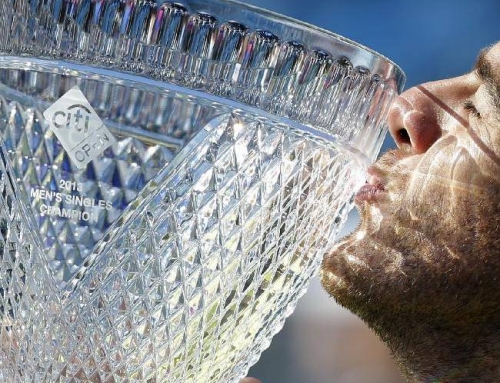 You know it’s the 2010’s. Back in 2001, Federer beat Sampras at Wimbledon, their only meeting. Federer was a teenager, and such upsets were often caused by teenagers on the rise. Today, there are no bright teens waiting to upset the top players. In 2012, Lukas Rosol upset Rafael Nadal in the second round of Wimbledon. No one thought of Rosol as the next great Czech talent.
You know it’s the 2010’s. Back in 2001, Federer beat Sampras at Wimbledon, their only meeting. Federer was a teenager, and such upsets were often caused by teenagers on the rise. Today, there are no bright teens waiting to upset the top players. In 2012, Lukas Rosol upset Rafael Nadal in the second round of Wimbledon. No one thought of Rosol as the next great Czech talent.
Rosol wasn’t 19, mind you. He wasn’t even 22 or 23. He was 26 heading on 27. Indeed, Rosol is 2 months older than the much more successful Tomas Berdych.
Many perceived that win as a flash in a pan, the kind of victory where all things worked well. Rosol was hitting extremely well missing nothing, and Nadal was a bit off his game. And Rosol did nothing to disprove that. He would lose in early round after early round, and few thought his game was heading up.
But one can’t discount the Davis Cup effect.
Most tennis pundits, especially American ones, favor only seeing top pros in Davis Cup. Just as many fans only want to see Federer and Nadal, many tennis experts only want to see them in the Davis Cup.
To provide an analogy, it’s long been asked why American college football lacks a national championship. It feeds the American desire for a number 1. However, there were many coaches that liked the patchwork solution that is the bowl system which provides upwards of 30 “champions” for each bowl that’s run. Sure, there may not be a definitive “best” team, but at least 30 teams feel pretty good about their season despite playing in the Krispy Kreme Podunk Bowl.
To that extent, many players are happy with Davis Cup success, even if it’s in a small region with little hope of moving up the World Group. Lukas Rosol was on the Davis Cup team that won last year, but he didn’t play a match. The two stalwarts, Tomas Berdych and Radek Stepanek, played every match, singles and doubles. Rosol was merely along for the ride.
But, in the last Davis Cup match, between Czech Republic and Kazakhstan (admittedly, not the biggest country in tennis, but nonetheless in the second round of the World Group), it was Lukas Rosol that was the hero. Berdych wasn’t playing and Stepanek, who was recovering from injury, merely played doubles (and lost). Rosol won both his singles matches, admittedly against lesser opponents, Golubev and Korolev.
Now, maybe, to the untrained eye, those wins are meaningless. Two victories against two nobodies. But you never know how confidence works. Think about this. In the 2004 Olympics, Nicolas Massu of Chile won both singles gold and doubles gold. Chile doesn’t produce a lot of good tennis players, but there was Massu and countryman, Fernando Gonzalez, both with medals? Where was Roddick? Where was Federer? Of course, Nadal and Djokovic were way too young back then. Massu surely relished this win as much as any other, despite beating a relatively unknown Mardy Fish to do so.
So when Lukas Rosol made a run to the Bucharest title, one had to imagine that his good feelings at Davis Cup was helping him to wins on the clay where he beat Muller, Seppi, Troicki, Simon, and Garcia-Lopez for the title, his first ever.
Meanwhile, at Barcelona, Nadal was being Nadal. Despite Almagro going up double break for a 3-0 lead, no lead ever seems safe against the king of clay, and Nadal kept clawing back until he took the first set 6-4. Nadal also got ahead in the second set, and won 6-3.
Thus, Nadal has reached every final he’s played this year, and won every title, save two (the first one in Chile, and Monte Carlo). Nadal is trying to work up the level of aggression so he can compete against Djokovic.



![[Basel] del Potro wins Basel over Federer for second consecutive year](https://www.essentialtennis.com/wp-content/uploads/2013/10/20131028delpo-500x383.jpg)
![[Stockholm] Dimitrov wins first ATP title with 3-set victory over Ferrer](https://www.essentialtennis.com/wp-content/uploads/2013/10/20131021grigor-500x383.jpg)

![[Metz/St. Petersburg] Simon and Gulbis are champions!](https://www.essentialtennis.com/wp-content/uploads/2013/09/20130922gulbis-500x383.jpg)
